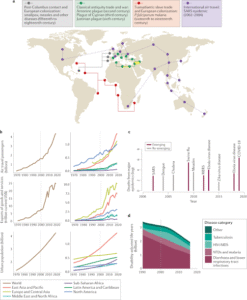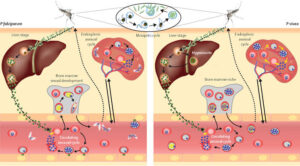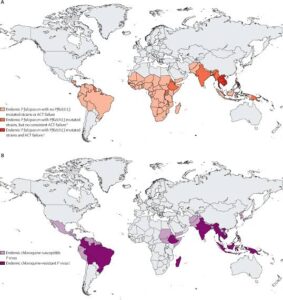Back to: MICROBIOLOGY 300 LEVEL
Welcome to class!
Hi brilliant scholar! It’s always a delight to have you here. You’re doing a fantastic job on your learning journey. Today, we’ll talk about Ebola, Zika, COVID-19, and resistant malaria strains—diseases that have shaken countries, challenged scientists, and changed how the world handles infections. These are not just textbook diseases—they’re real, current, and important. Let’s learn how they work and how we fight back.
Ebola, Zika, Covid-19, Resistant Malaria Strains
You’ve probably heard of Ebola from news stories about outbreaks in West Africa, or experienced the effects of COVID-19 firsthand. Zika virus made headlines for affecting babies during pregnancy. Malaria, on the other hand, has been with us in Africa for a long time, but now, some strains are becoming harder to treat. These diseases remind us how serious viruses and parasites can be—and how much science and public health matter.

Let’s look at each of them closely.
Ebola Virus Disease (EVD)
Caused by the Ebola virus, first discovered in 1976 near the Ebola River in the DRC.
Spread through contact with body fluids like blood, sweat, or vomit of an infected person or animal.
Symptoms: sudden fever, weakness, muscle pain, vomiting, diarrhoea, and sometimes bleeding.
Highly contagious and deadly if not treated early.
Controlled by quick isolation, safe burial practices, contact tracing, and now vaccines.
Nigeria managed to stop the 2014 outbreak through fast response—an example of successful public health work.
Zika Virus
Spread mainly by the Aedes mosquito (same mosquito that spreads yellow fever and dengue).
Usually mild symptoms: fever, rash, joint pain, and red eyes.
Dangerous during pregnancy—it can cause microcephaly (a birth defect where the baby’s head is smaller than normal).

First discovered in Uganda in 1947 but became a global concern around 2015 in Brazil.
Prevented by mosquito control, avoiding mosquito bites, and safe pregnancy planning.
COVID-19 (Coronavirus Disease 2019)
Caused by the SARS-CoV-2 virus, first reported in Wuhan, China, in 2019.
Spread through respiratory droplets, close contact, and surfaces.
Symptoms: cough, fever, tiredness, loss of taste/smell, and difficulty breathing.
Affected the entire world—lockdowns, masks, hand sanitisers, and virtual schools became the norm.
Vaccines like Pfizer, Moderna, AstraZeneca helped reduce severe cases.
Nigeria managed through NCDC efforts, awareness campaigns, and vaccinations.
Resistant Malaria Strains
Malaria is caused by Plasmodium parasites, especially Plasmodium falciparum.
Usually treated with artemisinin-based combination therapy (ACT).
Drug resistance has emerged, especially in Southeast Asia and some parts of Africa, meaning some malaria parasites survive even after treatment.
This is worrying because it makes treatment harder and can lead to more deaths.
Scientists are working on new drugs and malaria vaccines to fight resistance.
Preventive actions like insecticide-treated nets and mosquito control remain essential.

Imagine your cousin in Bayelsa develops a high fever and bleeding gums. The hospital runs tests and finds it’s Ebola—immediate isolation, protective equipment, and contact tracing begin. Meanwhile, your aunt who returned from Brazil is asked to test for Zika because she’s pregnant. At school, you wear a mask and learn online because of COVID-19. A classmate takes malaria drugs but isn’t getting better—that’s how resistance shows up. All these situations are very real, and understanding them helps protect lives.
Summary
- Ebola is a deadly virus spread by body fluids; quick action saves lives.
- Zika is spread by mosquitoes and can affect unborn babies.
- COVID-19 changed the world; vaccines and prevention are key.
- Malaria resistance means some strains no longer respond to normal treatment.
- These diseases teach us that science, awareness, and good health systems are powerful tools.
Evaluation
- How is Ebola virus transmitted?
- Why is Zika virus dangerous for pregnant women?
- List two symptoms of COVID-19.
- What is drug-resistant malaria?
- How can malaria resistance affect treatment?
Amazing work today! You’re not just learning facts—you’re gaining the knowledge to be part of real-world solutions. Whether it’s protecting your community or leading in healthcare one day, Afrilearn believes in your potential. Keep showing up, keep growing. You’re exactly where you’re meant to be. See you in the next class!
